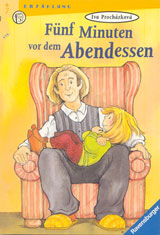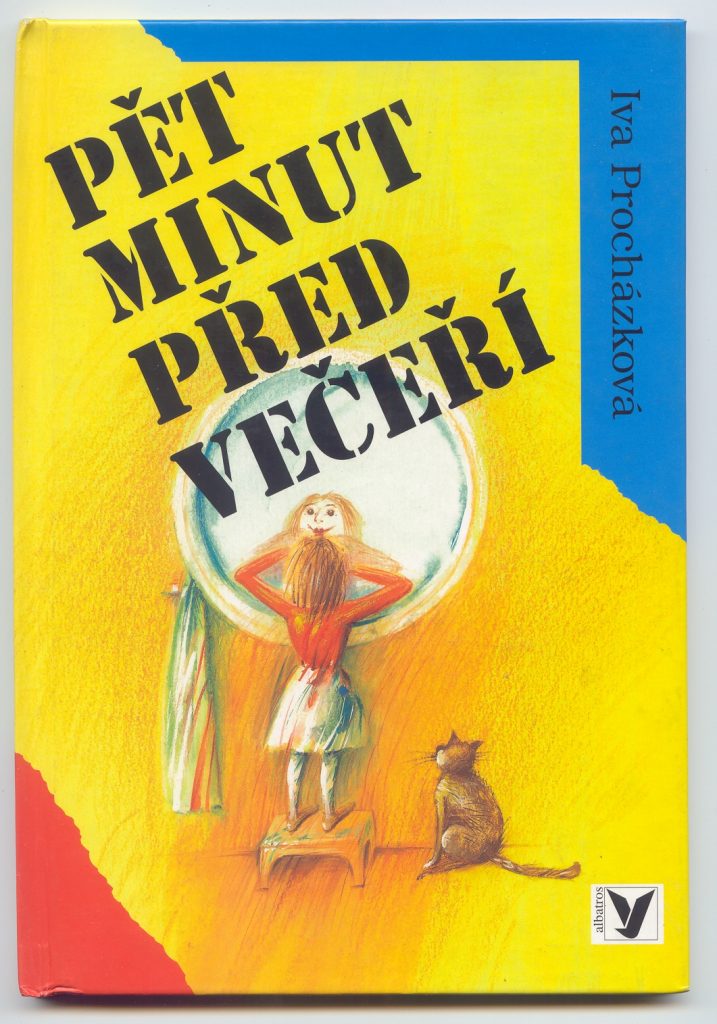In winter, days are as short as a ride on a merry-go-round. As soon as the sun slides down the roof across the street, night swims into the room: a big, blue, bug-eyed fish. Whoever he looks at is overcome by drowsiness. Just now he looked at Daddy, and Daddy yawned loudly three times. Babeta goes up to Daddy’s armchair and leans over close to his face.
“Stop yawning,” she warns him. “Or else I’ll catch it from you, and we’ll both fall asleep.”
“I don’t want to hear a word about sleep!” calls Mommy from the kitchen. “We’re having supper in five minutes!”
Of course, Mommy’s five minutes are different every time. It’s better not to look at the hands on the clock. Not to wait. To have a little chat.
“But I don’t know any fairy tales,” objects Daddy.
“Well then, make one up.”
“I don’t know how to make one up.”
“Well, talk about yourself then!” suggests Babeta and climbs up into Daddy’s lap.
“About yourself, about Mommy and about me! And all about how it used to be!”
“That’s really a long story,” sighed Daddy. “I don’t know whether I could finish it in five minutes.”
“You can finish any story in five minutes if you know what’s important!” Babet instructs him and makes herself comfortable. “You know that, don’t you?”
“Well, I guess I do.”
“All right, then start.”
Daddy blinks trying to shake off the drowsiness that is making his eyelids droop.
“Well then, . Once upon a time there was a young man.”
“That was you, wasn’t it?”
“Don’t interrupt me, otherwise I’ll forget what’s important!” grumbles Daddy. “What did I just say?”
“Once upon a time there was a young man,” Babeta helps him.
“And this young man,” continues Daddy, “brought people letters, and newspapers, and postcards, and checks, and sometimes even money. And everybody smiled at him, and everybody greeted him when he walked up and down that long street every day.
His route took him right by the hairdresser’s shop. Through the shop window you could see a polished mirror and in it the reflection of the hairdresser’s face. Sometimes she had a mouthful of hairpins, sometimes she was bent down low over the soapy head of some customer, then at other times she would flick around with a pair of big scissors sticking out the tip of her tongue in concentration. But every time the bell hanging above the door rang and the postman stepped in, the hairdresser turned around and looked at him expectantly. She was young and very pretty.”
“Because it was Mommy,” adds Babeta.
“See that, you’re interrupting me again!” exclaims Daddy.
“I’m not interrupting you,” Babeta defends herself. “I just want to give you some advice so that you’ll call this postman Daddy and the pretty hairdresser Mommy, because it’s easier and actually very important.”
“You think so?”
Babeta nods eagerly.
“But now keep you lips tightly closed and listen.”
Babeta obediently clasps both hands over her mouth and tilts her head to the side like a dog with its ears perked up.
“Daddy brought the newspaper, and magazines, and now and then a bill,” Daddy goes on, “but Mommy was expecting a letter. And that letter didn’t arrive. And the longer it took for the letter to arrive, the sadder and more impatient Mommy became.”
“And bigger,” remarks Babeta.
“Will you keep quiet, or do you want to tell the story yourself?” Daddy said angrily.
“I’ll be quiet,” Babeta assures him. “But I’m afraid that you’ll forget that Mommy had such a tummy because.”
“Because she was carrying a baby in it.” This time it was Daddy’s turn to interrupt Babeta.
“And that was me,” whispers Babeta, so softly that Daddy doesn’t scold her but continues telling the story.

